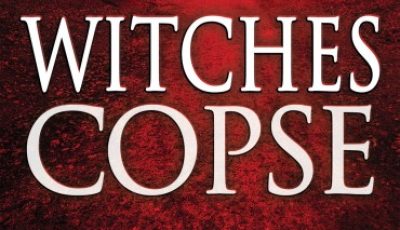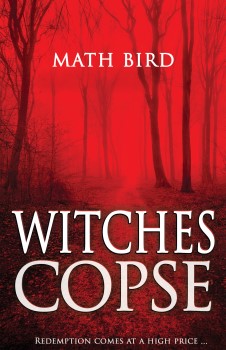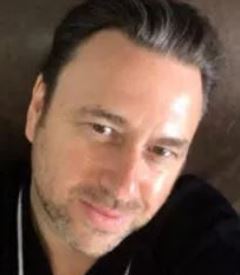

Witches Copse by Math Bird
 It’s 1979, the Winter of Discontent, and gun for hire Elizabeth Daton’s career ends abruptly when a job results in a young girl being hospitalized. Her luck changes when renowned barrister Quentin Quinby hires her to travel to a remote Welsh village and escort an acquaintance of his back to London from the ominous Witches Copse.
It’s 1979, the Winter of Discontent, and gun for hire Elizabeth Daton’s career ends abruptly when a job results in a young girl being hospitalized. Her luck changes when renowned barrister Quentin Quinby hires her to travel to a remote Welsh village and escort an acquaintance of his back to London from the ominous Witches Copse.
Daton agrees, desperate to make amends, believing she’s been given a second chance. But what begins as a simple errand quickly escalates into a terrifying ordeal of possession, witchcraft, and the occult.
Can Daton triumph, or is she doomed to pay redemption’s price?
Math Bird recently spent some time with The Big Thrill discussing his latest thriller, WITCHES COPSE:
What do you hope readers will take away from this book?
First and foremost, I hope it’s a solid entertaining read. Then perhaps as the first part of WITCHES COPSE centers around a remote Welsh village and the ancient woods and hills that surround it, readers new to those areas will become more familiar with Wales and the Welsh landscape, which play a significant role in my writing. Also, I hope they enjoy a crime noir thriller and the folklore horror elements blended into it.
What attracts you to this book’s genre?
WITCHES COPSE is a hybrid genre; not only is it a crime noir thriller, but it also has many elements of folklore horror and the occult. I’ve been a fan of folklore horror ever since I saw The Wicker Man many moons ago. Often thought of as a very British sub-genre, it’s branched out over the years and made inroads into crime, i.e., Ben Wheatley’s Kill List. With a crime noir narrative at its core, WITCHES COPSE also draws inspiration from many folklore horror stories and is definitely of a similar ilk.
No spoilers, but what can you tell us about your book that we won’t find in the jacket copy or the PR material?
WITCHES COPSE also contains book extracts within a book, an imaginary biographical piece written by one of the antagonists entitled The Strange Lives of Helenora Haye.
What authors or books have influenced your career as a writer, and why?
There are so many, and I never want to narrow it down to one or two authors as it changes, and I admire all the writers and the novels I read, and each has an influence, to varying degrees, consciously or subconsciously. However, when writing WITCHES COPSE, I read a lot of Shirley Jackson and Cornell Woolrich, but other writers such as Laird Barron and Ben Myers, to name but a few, were also an inspiration.
Is there a question that you feel is important to you and/or your novel? Write it in below, but be sure to answer it too!
Q: How important are the notion and the exploration of place in your work?
A: Growing up in the northeast corner of Wales, borders have played a significant part in my understanding of place. Most of northeast Wales lies on the border between England and Wales. Neither fish nor fowl, it’s an in-between place. This could apply to most borderlands and cross-border territories—each a curious amalgam of social and cultural landscapes. Place plays a significant role in our lives. Our sense of it and whether we feel ‘in’ or ‘out’ of place affects who we are, what we were, who we might become.
Crime and noir fiction provides me with an excellent vehicle to explore these notions of place and belonging, ‘inhabitant’ or ‘outsider’, social and geographical borders, the conflicts between the rural and the urban—the periphery and the center.
*****
Math Bird is a British novelist and short story writer.
He’s a member of the Crime Writers Association, and his work has aired on BBC Radio 4, Radio Wales, and Radio 4 Extra.
To learn more about the author and his work, please visit his website.
- LAST GIRL MISSING with K.L. Murphy - July 25, 2024
- CHILD OF DUST with Yigal Zur - July 25, 2024
- THE RAVENWOOD CONSPIRACY with Michael Siverling - July 19, 2024

